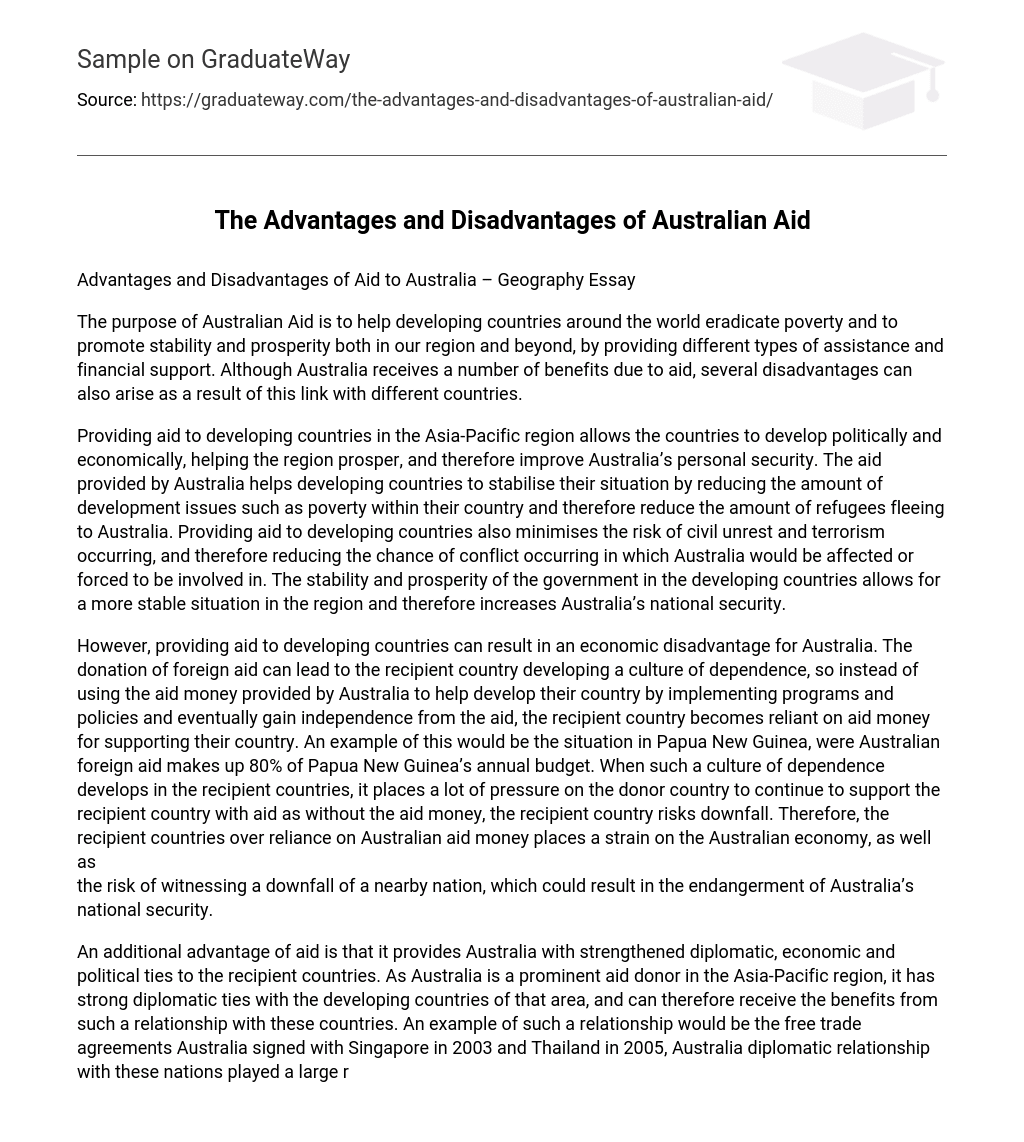The purpose of Australian Aid is to help developing countries around the world eradicate poverty and to promote stability and prosperity both in our region and beyond, by providing different types of assistance and financial support. Although Australia receives a number of benefits due to aid, several disadvantages can also arise as a result of this link with different countries.
Providing aid to developing countries in the Asia-Pacific region allows the countries to develop politically and economically, helping the region prosper, and therefore improve Australia’s personal security. The aid provided by Australia helps developing countries to stabilise their situation by reducing the amount of development issues such as poverty within their country and therefore reduce the amount of refugees fleeing to Australia.
Providing aid to developing countries also minimises the risk of civil unrest and terrorism occurring, and therefore reducing the chance of conflict occurring in which Australia would be affected or forced to be involved in. The stability and prosperity of the government in the developing countries allows for a more stable situation in the region and therefore increases Australia’s national security.
However, providing aid to developing countries can result in an economic disadvantage for Australia. The donation of foreign aid can lead to the recipient country developing a culture of dependence, so instead of using the aid money provided by Australia to help develop their country by implementing programs and policies and eventually gain independence from the aid, the recipient country becomes reliant on aid money for supporting their country.
An example of this would be the situation in Papua New Guinea, were Australian foreign aid makes up 80% of Papua New Guinea’s annual budget. When such a culture of dependence develops in the recipient countries, it places a lot of pressure on the donor country to continue to support the recipient country with aid as without the aid money, the recipient country risks downfall. Therefore, the recipient countries over reliance on Australian aid money places a strain on the Australian economy, as well as
the risk of witnessing a downfall of a nearby nation, which could result in the endangerment of Australia’s national security.
An additional advantage of aid is that it provides Australia with strengthened diplomatic, economic and political ties to the recipient countries. As Australia is a prominent aid donor in the Asia-Pacific region, it has strong diplomatic ties with the developing countries of that area, and can therefore receive the benefits from such a relationship with these countries. An example of such a relationship would be the free trade agreements Australia signed with Singapore in 2003 and Thailand in 2005, Australia diplomatic relationship with these nations played a large role in the securing of these two agreements.
Australia can also benefit from such a good relationship politically as the recipient country of Australian aid can support Australia’s politics. A strong relationship with a recipient nation would also allow Australia to form economic bonds with the developing country, such as the agreement of tied aid money – were the recipient must spend some of the aid money provided by Australia on Australia’s goods and services, therefore strengthening Australia’s economy. Hence, creating and maintaining strong relationships with recipient nations of Australian aid is advantages as it yields diplomatic, economic and political benefits for Australia.
Another disadvantage of Australian aid is the risk of corruption occurring in the recipient country. If Australia provides a country with a certain amount of aid money and there is corruption in the recipient country then the money provided is lost and the intended receivers of the aid money never actually get the help they are in need of, resulting in no actual change occurring in the situation of the developing country, but causing Australia to lose money.
If such a thing were to happen, then there could be a negative effect on the Australian economy as Australia would have to keep providing the recipient nation with aid in order to see some sort of result. Such a situation could also put a strain on the diplomatic relationship between the two countries, if Australia’s aid money is going to waste then it would want to either sever the relationship with such a country or begin to control how the aid money it is providing is spent, but such a control could neglect certain wants and needs of the recipient country and could also be seen as an interference with the countries personal affairs. Therefore, the risk of corruption occurring in a recipient country is a great disadvantage to the Australian aid link as it could result in the disturbance of Australia’s economy and its diplomatic ties with other nations.
Australia’s aid program can result in several advantages for Australia, such as a boost to the economy and strengthened ties with other countries, this link could also yield some disadvantages for Australia such as creating a culture of dependence with some countries and the risk of encountering corruption in others. Though as of yet, the Australian aid program has been a successful endeavour, and any disadvantages that could have arose have been outweighed by the advantages that have occurred, and as a result the program continues to fulfil its main purpose and that is to eradicate poverty and promote prosperity in all regions of the world.





